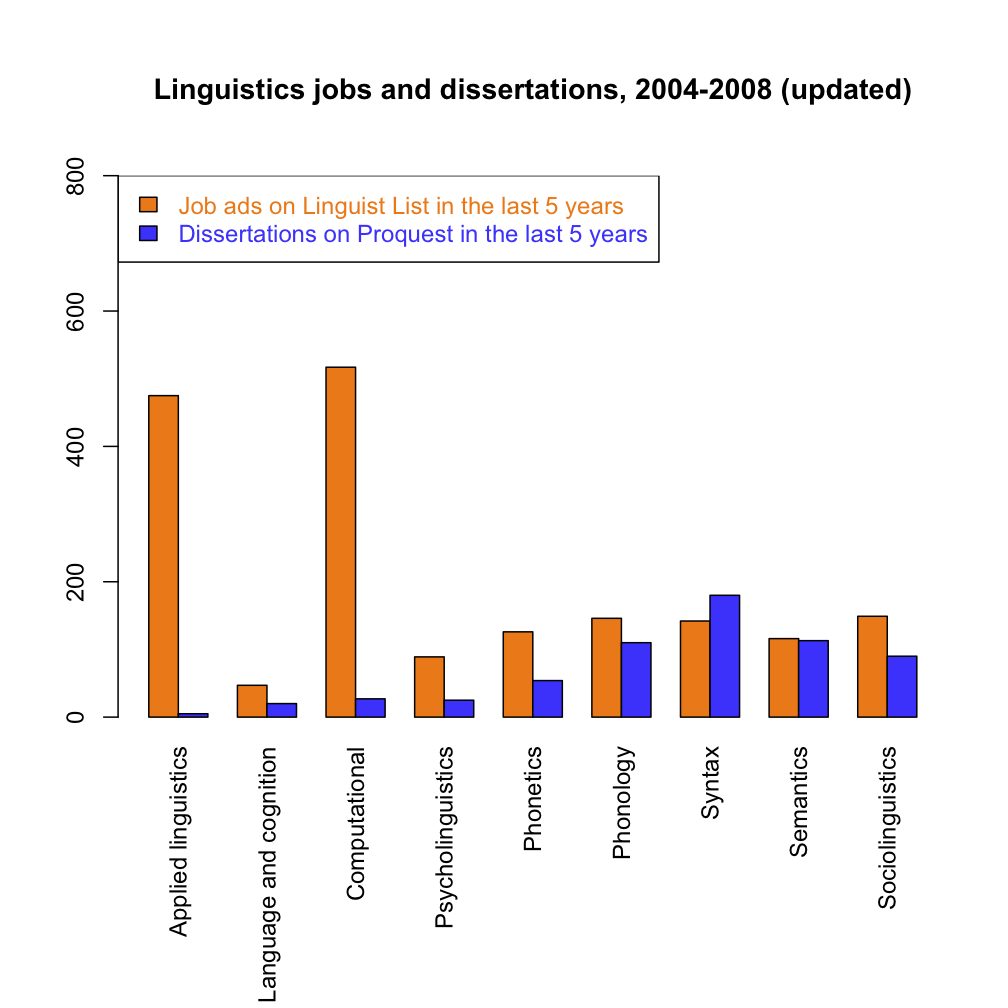Jobs in linguistics: more comparable numbers
« previous post | next post »
Early this year, Heidi Harley and I posted a few times about the job market in linguistics. I got the ball rolling with a post about the Linguist List's 2008 job ads. Heidi followed up with a comparison between the job-ad numbers and the indices at ProQuest, and then I put those numbers together.
The combined post told a dispiriting story about the theoretical areas: it looked like there was a serious mismatch between the number of PhDs and the number of jobs for them. I think now, though, that this was based on an unfair comparison. John McCarthy pointed out to me that the ProQuest counts we reported are not relativized to dissertations per se, but rather come from a more general search of ProQuest's databases.
If the ProQuest search term restricts always to (i) dissertations, (ii) the Linguistics subject area, and (iii) the last five years, then one gets much smaller numbers throughout, and the hits themselves seem generally reasonable. Here's a graph comparable to my earlier one, with the same job-ad numbers but the more restrictive ProQuest numbers.
This tells a different (and more heartening) story that the previous version. While it continues to support the notion that it is very smart to get computational or experimental training, it suggests that the theoretical areas have actually achieved a good balance between the number of PhDs they produce and the number of jobs available. (Of course, it is still a very tough market.)
There are lots of caveats (see the comments on the previous post for some important ones). In particular, the applied, cognitive, and computational areas are hard to assess, because of the numerous ways that scholars can identify their own work. I uniformly restricted the ProQuest searches to the subject area Linguistics, on the assumption that people browsing Linguist List for jobs will also be inclined to assign their work to the Linguistics subject area, and vice-versa. Here is a table of the ProQuest seaches I did:
Throughout: SU(Linguistics) AND PDN(>6/9/2004) AND NOT DISVOL(mai) |
||
|---|---|---|
| Area | Search term | Hits |
| Applied linguistics | IF(Applied linguistics) |
5 |
| Language and cognition | IF(Cognition) |
20 |
| Computational | IF(Computation) OR IF(Natural Language Processing) OR IF(Natural Language Engineering) |
27 |
| Psycholinguistics | IF(Psycholinguistics) |
25 |
| Phonetics | IF(Phonetics) |
54 |
| Phonology | IF(Phonology) |
110 |
| Syntax | IF(Syntax) |
180 |
| Semantics | IF(Semantics) |
113 |
| Sociolinguistics | SU(Linguistics) |
90 |

Bill Walderman said,
June 9, 2009 @ 12:12 pm
Not being a professional linguist, I'd be interested in learning what sorts of jobs are encompassed by the field of applied linguistics. Could someone please enlighten me?
[(myl) The term applied linguistics doesn't, in fact, mean "applied linguistics". Instead, it (almost always these days) means "(study of) second language teaching and learning". (Though see this interview with Michael Halliday for a somewhat broader perspective.)
The largest number of jobs in that area are obviously actual language-teaching jobs. But I suspect (without checking) that the Linguist-List job postings counted in in the figure above are mainly for jobs in language-teaching teaching, so to speak; i.e. jobs teaching applied-linguistics courses at the college or university level.
In the strictly compositional sense of the phrase, "applied linguistics" might also include jobs in the many areas of speech and language technology, or in the many clinical fields where speech and language are relevant, or in research on the psychology of reading, or for that matter in literary analysis and the teaching of writing. But I rarely see people working on applications of linguistics in those areas refer to what they do as "applied linguistics", which (as far as I can tell) is because the term has been pre-empted by its connection with language teaching. ]
marie-lucie said,
June 9, 2009 @ 1:24 pm
I wrote a grammar of an underdescribed indigenous language for my dissertation, so I was told my doctorate would be in "applied linguistics", not just "linguistics", because my topic was not a theoretical contribution. But this is an extreme case of defining "applied linguistics", and I do not use it myself.
About the various specialties in linguistics, I see that the chart does not include "historical linguistics", which was not in the earlier version either. This specialty seems to have fallen below the radar altogether.
Nassira Nicola said,
June 9, 2009 @ 2:19 pm
Mark and Bill – I'd add things like "language policy and planning" to "language teaching" as another primary concern of applied linguistics.
The AILA website has a decent description of the field, at least as they and their members conceive of it.
Bill Walderman said,
June 9, 2009 @ 4:15 pm
Thanks, myl and Nassira.
Mike Maxwell said,
June 12, 2009 @ 5:44 pm
I suppose this explains why we've had trouble hiring a computational linguist this last year!
However, my guess is that most working computational linguists these days are (unlike myself) from the computer science side of the house, rather than the linguistics side.